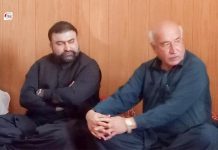By: Ganjal Baloch
Uncertain about whether to write this or not, I ultimately decided to go ahead. Throughout our prolonged struggle as a nation, we have experienced significant learning and unlearning. One crucial lesson we have learned is the importance, as well as the insignificance, of social media. As an oppressed nation where mainstream media is heavily censored, social media remains our primary platform to express ourselves. Unfortunately, even on social media, our accounts are often suspended for shedding light on our issues. Nevertheless, we have managed to successfully raise our voices.
Regrettably, there is a negative aspect to social media, where some individuals, intentionally or unintentionally, divert their focus from our common enemy to attack our own people and our national struggle for independence. It pains me to say that today, instead of highlighting the brutality and tactics of our oppressors or the policy of Baloch genocide, we find ourselves engaged in debates about our internal policies regarding our national liberation movement.
I want to emphasize a crucial point: only a small number of individuals lacking intellectual depth are exploiting social media to undermine the war of independence. These individuals, who are or were once part of our national struggle, gain nothing but make fools of themselves in front of the people. Their actions not only please our enemy but also strengthen the narrative that the Baloch people lack unity, a narrative that the state has propagated for decades. By engaging in such behavior, we unintentionally reinforce this damaging narrative.
This reminds me of the novel “Ignorance” by Milan Kundera, focusing on the experiences of Irena and Josef, who return to the Czech Republic after spending two decades abroad. Irena left the Czech Socialist Republic in 1969 and sought refuge in France, while Josef, whom she knew from her youth in Bohemia, also left in the same year and settled in Denmark. Both of them fled the oppressive communist regime and established new lives in Europe. Following the Velvet Revolution, which marked the end of the communist regime in Czechoslovakia and the subsequent separation of the Czech Republic and Slovakia, Irena and Josef decided to visit their native country after a long period of self-imposed exile. However, Irena, despite spending two decades in Paris, still faces a lack of acceptance from her French friend Sylvie, who does not consider her fully integrated into French society. The novel opens with a conversation between the two women in a Parisian bistro:
“What are you doing still here?” Her tone wasn’t harsh, but it wasn’t kindly either; Sylvie was indignant.
“Where should I be?” Irena asked.
“Home!”
“You mean this isn’t my home anymore?”
Irena is taken aback by her friend Sylvie’s assumption that she still belongs to the Czech Republic, despite her 20-year stay in France and her identification as a French citizen. Sylvie’s choice of language implies that Irena’s true home is the Czech Republic.
When Irena initially arrived in France in 1969, she and her husband Martin experienced recurring nightmares of being deported back to the Czech Socialist Republic. These dreams played with Irena’s mind, showcasing the paradise she had lost during the day and the hell she had escaped at night.
A significant event in the novel symbolizing the “Ignorance” referred to in the title is Irena’s mother’s visit to Paris after seventeen years of separation. Irena tries to impress her art-loving mother by taking her to various museums and galleries in Paris. However, when they visit the Rodin Museum, Irena’s mother fails to appreciate the works of the French artist. She shows no interest in her daughter’s life in Paris, instead incessantly discussing the happenings and people of Prague. Despite Irena spending the last 16 years in Paris, her mother refuses to acknowledge her as a Parisienne and disregards her life in France.
When Irena returns to her native land after 20 years, another instance of ignorance is evident when she invites her old friends from Prague to dinner. She orders 12 bottles of Bordeaux, but her friends fail to appreciate the wine she selected. Only when one friend takes the initiative to order beer do the others feel comfortable and follow suit. This rejection of the wine symbolizes their resentment towards Irena, viewing her as an opportunist who left them behind. Beer, being associated with ordinary people, resonates with her friends, while Irena is accused of pursuing a better life.
Irena accepts her guests’ preference for beer but yearns to have control over the conversation and be heard. However, her attempts are unsuccessful as the women speak simultaneously, disregarding her. Realizing her changed status, Irena joins the others in drinking beer, and one of her husband’s former colleagues acknowledges her transformation. In a conversation with this woman, Milada, Irena recognizes that the guests have no interest in her life in Paris or her struggles and achievements. They only celebrate her return to Prague. Ultimately, Irena understands their lack of curiosity, as they have no emotional connection to her journey.
Reflecting on her evening, Irena contemplates her French friend Sylvie, who encouraged her to return to Prague. In her thoughts, Irena expresses frustration, acknowledging that she could go back and live with her old friends, but at the cost of sacrificing her life in France. She would need to lay her entire existence on the altar of the homeland and burn it, paying the price to be pardoned and accepted once again.
Josef’s decision to return to the Czech Republic was influenced by his Danish wife, who believed it was unnatural and unjustifiable for him not to go back. He had envisioned that everything would remain the same and that he could reclaim the belongings he left behind in 1969. However, upon visiting his hometown in the Czech Socialist Republic and meeting his brother and sister-in-law, Josef felt as though he was reentering the world like a resurrected man emerging from a tomb after two decades.
When Josef left the country 20 years earlier, he never considered the possibility of returning, so he entrusted the keys to his flat to his brother, allowing him to take whatever he wanted before the Communist regime could confiscate his belongings. Josef is particularly eager to reclaim a picture drawn by a Czech artist, which now hangs in his brother’s house, as well as an old watch that used to belong to him but is now worn by his brother. However, his brother and sister-in-law assert that Josef has no right to reclaim these items.
Unlike his brother and sister-in-law, Josef chose to cross the border and leave without any regrets. Those who remained in the Socialist-governed Czech Republic believe that Josef had no reason or opportunity to concern himself with memories tied to a country he no longer resided in.
The purpose of shedding light upon the story by Milan Kundera is that being far away from your homeland and thinking you can effectively defend it from a distance is often a foolish idea. As depicted in the novel, the characters’ opinions and perspectives are not accepted or valued in either their native land or the place they have chosen to reside.
Today, some individuals approach issues with a humanistic lens, aiming to preserve humanity. However, they may not fully grasp that when a nation is colonized, human rights are frequently violated on a daily basis, making their preservation nearly impossible until decolonization is achieved. It can be argued that merely highlighting Balochistan’s issues from foreign lands is often futile.
An example of this is when Lateef Johar attended Barrick’s AGM in Canada and faced discriminative comments from the CEO of Barrick Gold, who used his refugee status to discredit him and refused to answer his questions, instead telling him to “go back to Balochistan.” This highlights the status of our people who believe they are human rights champions but are met with dismissal and ignorance even in other countries. And then these people believe that sharing their opinions on social media will bring about change, which is unlikely to occur.
Indeed, the lines from Milan Kundera’s novel “Ignorance” resonate with the sentiment expressed in the preceding discussion: “You are far away, and I don’t know what has become of you. My country is far away, and I don’t know what is happening there.” These words capture the sense of distance, separation, and uncertainty that can arise when individuals are geographically removed from their homeland and their people. It reflects the feeling of being disconnected from one’s roots and the longing for knowledge about the current state of affairs in their country.
The people who are actively involved in this war understand that it is the only option for their survival, dignity, and liberation. They recognize that no one else will ensure their freedom except for the Baloch people themselves.
Disclaimer: The views and opinions expressed in this article are those of the author and do not necessarily reflect the official policy or position of The Balochistan Post or any of its editors.






























